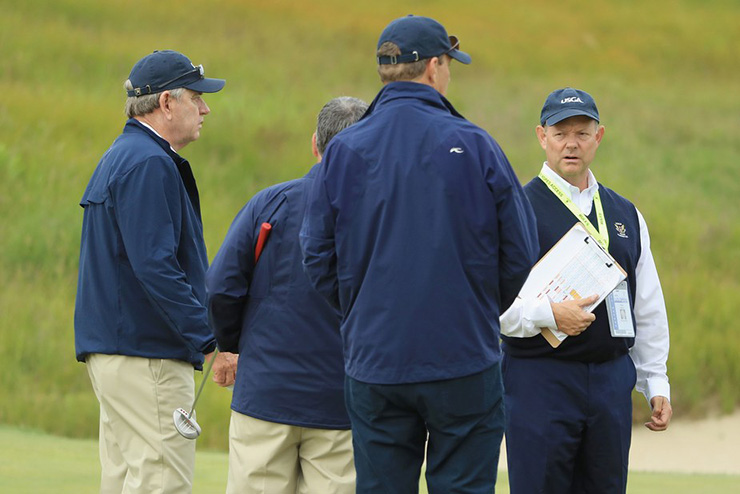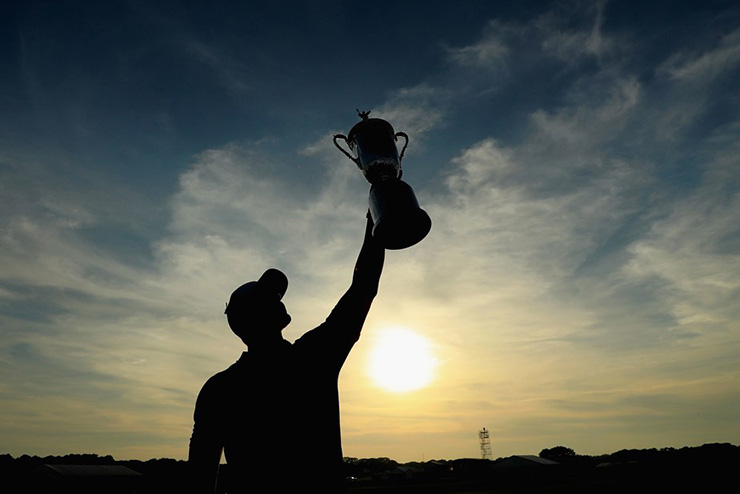By Shane Ryan
Life often vacillates between the tragic and the absurd. The former is to be avoided and feared. The latter is to be embraced. Theatre nerds in ancient Greece even made masks to broadcast this simple duality to their audience—mawkish weeping, on one hand, manic laughter on the other.
Tragedy sometimes infringes on the world of golf, but within the confines of the course, there is little room for it. Golf is supposed to be a game, after all, though in 2018 the game comes with a good deal of history and enforced politesse and fussily manufactured gravitas—perhaps more so than any other sport.
With its unceasing demand for excellence at the microscopic level, golf can be like a watchful spouse with a talent for spotting everything you do wrong. This unbearable scrutiny can yield only failure and frustration, and the ensuing anger—over something so small, so avoidable—is a perfect human rendition of absurdity.
The USGA, god bless it, has become experts at transcending the self-image golf has manufactured for itself and exposing the sport’s absurdity in its most naked form. As a governing body, it elicits anger, censure and failure, and does so with a kind of brazen incompetence all its own. I will not try to claim the USGA is run by a group of comic geniuses, because I’m all but certain they aren’t acting intentionally. But I would pose this question: If they were a cabal of impish trolls with the mission of undermining the sport and all its players … well, how would they behave differently?
The melodrama at Shinnecock Hills was the cherry on top of a four-year performance-art piece that began in 2015 at Chambers Bay. When USGA CEO Mike Davis appeared on television at the end of Saturday’s round on Long Island to apologize for the course conditions—hasn’t someone told him that in modern-day America, the worst thing you can do is say ‘I’m sorry’?—it represented the beautiful culmination of thousand-plus days of entropy.
Let’s revisit:
• At Chambers Bay, the greens appeared to play like they had been perforated by a thousand rogue forklifts, which may have contributed to one of the more gut-wrenching finishes we’ve ever seen, hamstringing one unlucky career (Dustin Johnson) while galvanizing the legend of another (Jordan Spieth). Also, there was nowhere for the spectators to watch unless they wanted to free climb the perilous blasted rocky face of the reclaimed quarry.
• At Oakmont a year later, not content with the pain they’d imparted on Johnson the year before, officials couldn’t resist sending one of their own out mid-round to tell him he was playing under a penalty. He won anyway, but once more the story was about the organization.
• At Erin Hills a year later, the promised wind never blew, and the same people who get angry when a course is too hard now became angry that it was too easy, setting itself up for a cruel bludgeoning by Brooks Koepka.
• Finally, at Shinnecock, the conditions on Saturday were so hard that the sensitive souls tasked with navigating it felt compelled to go on television and issue dire proclamations about how the USGA had “lost the course.” Phil Mickelson acted out by chasing down and hitting his own errant putt before the ball stopped, which became a bigger story than Koepka’s repeat win. Eventually, it forced the Davis apology.

Nick Price (right) and Mike Davis (left) thought they had a handle on the course set-up until they didn’t. (Andrew Redington/Getty Images)
The interesting parenthetical here is that there’s an interpretation under which the USGA is mostly blameless. Look at Shinnecock: If it truly wasn’t a fair test, why were some of the best players in the world at the top of the leaderboard? Why did it come down to a battle of some of the exact players you’d expect to be hashing it out on Sunday? Could it be the case that Patrick Reed was right and that even in the depths of Saturday’s depravity, there were only two unfair pins, and the rest was a product of the weather? Could it be the case that someone like Zach Johnson, he of the “lost the course” brigade, was actually being a baby? Could it be the case that professional golfers, on the whole, tend toward the entitled, the hypersensitive and that the ones who routinely compete for major championships are significantly tougher and more resilient than the ones who finish early and complain to the media?
Of course, it’s true. But that, too, is the brilliance of the USGA. Without intending to, the association exposes these mental weaknesses. Not content to merely highlight the flaws in a player’s game, they go so far as to reveal their emotional deficiencies.
What did we learn, for example, about Mickelson? Reading between the lines, you could infer all of the following from his bizarre putt-chasing episode:
1: That he deals with frustration by acting out against those who dare challenge him.
2: That he has a compulsion to make every story about himself.
3: That he revels in his larger-than-life image and is constantly seeking to stoke it.
4: That he tends toward brinkmanship—it would never be enough for him to merely complain about the course; he must push toward conflict in the most public way possible (see also: Tom Watson, 2014 Ryder Cup).
5: That there’s a fundamental lack of self-control at his emotional centre.
6: That he’s not afraid to use his status to intimidate, knowing that he is mostly untouchable.
7: That the U.S. Open has rented out space in his head after too many near-misses.
8: That he will never forgive them for it.
Who else but the USGA could make these truths manifest in one telling moment? And who else could choreograph such an exquisite ballet of well-meaning buffoonery? As I said, Davis’ apology was the coup de grace—it fixed nothing, it wasn’t truly necessary, and it only ensured that the golf world would live and breathe USGA for the next 24 hours. How could it be otherwise?
The powers-that-be at the USGA have so fully enshrined themselves into our consciousness that there is no longer any possibility of a well-run U.S. Open. We won’t allow it. We will watch 156 golfers lean forward into pounding wind and rain at some glorified coastal sheep pasture at the British Open, and we’ll smack our hands together in credulous applause because we can shut our eyes and see the game’s origin. We will stomach the ceaseless treacly brand-advancement from Augusta, and only a few of us will have to stifle a gag reflex. We will watch the PGA Championship, and strain against our own apathy.
But the USGA? These folks are the unforgiven black sheep of the major world, and we would find fault in paradise if they were the architects. They are irredeemable, and thus they are also indispensable. Confession: I can’t live without the USGA. I know the truth, which is that deep down the players just hate being made to play on tough courses, and American golf fans are so conditioned to serfdom that we recoil in anger alongside them when conditions result in their humiliation.

Despite everything, the U.S. Open had marquee players fighting to the finish on Sunday, with Koepka repeating as the champ. (Andrew Redington/Getty Images)
We shouldn’t—we should embrace their humiliation. It’s coming for us all, believe me, and humiliation is never funnier than when it happens to the powerful. That is the heart of absurdity—to see the defences and pretences and affectations we’ve built up shatter and crumble in the face of an indifferent universe. And the rage it spawns, that raw indignation when the world won’t cater to the self-image we’ve so carefully constructed, is the stuff of true comedy.
Once per year, I crave it. I want players to vanish bodily into brutal bunkers. I want putts to run for miles. I want to discover skeletons, weeks and months later, in the tall clumpy grass of the rough. I want the USGA to reign for one thousand years.
And—incidentally—there’s also this: When a certain player survives with his dignity more or less intact, and when that player escapes the dual temptations of capitulation and complaint, and when he soldiers on while his peers are dropping all around him, and the conditions fortify rather than defeat him because he possesses a mettle that cannot be destroyed by the rigor of adversity or the softness of privilege, do you know what you’re left with?
An honest-to-god champion, that’s what.









